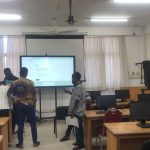A Professor of Linguistics at the University of Calabar ,Nigeria and MIASA Fellow , Eyo Mensah has intimated that African governments must take bold steps to eliminate gender bias in the productive sectors of their countries .
The call comes on the back of the Merian Institute for Advanced Studies in Africa (MIASA)at the University of Ghana holding its 3rd public lecture for the year on the topic “Women as public transport providers”.
Speaking at the event, Guest Lecturer , Professor Eyo Mensah indicated that the outcomes of his findings which was focused on the activities on female public transport providers in Lagos ,Nigeria showed that as compared to male colleagues in the same business, the females braved the odds to excel in providing safe and comfortable services to their customers in most cases to the general satisfaction of the patrons.
” Despite the obstacles and challenges faced by the few female public transport riders in the Lagos area as shown by my rsearch findings like verbal attacks, unsavoury words and lack of access to credit to fully own the tricycles , feedback and data shows that the riders manage to be as efficient in doing their job of facilitating movements to and fro short distances within Lagos to the satisfaction of people who patronise their services in the course of the day”.
Also, Professor Eyo Mensah also implored on the relevant local and state authorities to craft policies that can reduce the gender bias gap between females and males in the productive sectors of the economy by ensuring that soft loans and technical training modules for the transport providers consciously targets women to get them to be financially stable to support their families.
” My findings indicate that the concept of tricycle riders was introduced sometime in the 1990s to help eradicate poverty among the active population of the youth and middle aged persons in Nigeria, but due to corruption and lack of policy monitoring and evaluation, the impact of the overall policy has not been felt by the target group particularly ,the women who decided to enrol on the programme initiated by the government sometime back. It is time for African governments and societies to end gender bias against women by empowering and investing resources into building their capabilities to be changemakers ,instead of undermining and setting them up for societal ridicule when studies have shown that ,women are as productive or more in economic ventures as men if they are all treated on the basis of competence rather than gendered roles”.
Tricycles were first used in Nigeria in 1996 when it was introduced by Col. Mohammed Marwa, the then military governor of Lagos State. He introduced the tricycle with the sole aim of increasing and expanding the commercial transportation system in Lagos State.
This was what prompted the tricycles to be nicknamed “Keke Marwa”, which means Marwa’s tricycle in the Yoruba language. However, the name, Keke Napep” surfaced when the administration of president Olusegun Obasanjo introduced the National Poverty Eradication Program (NAPEP) in 2001.




